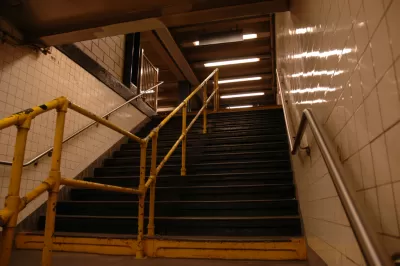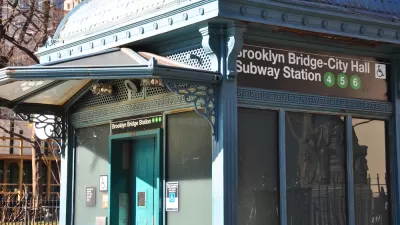The city’s subway system is lagging in station accessibility, but the MTA has a plan to add elevators to 70 stations.

"Only about a quarter of New York City’s 472 subway stations are wheelchair accessible, one of the lowest percentages of any major transit system in the world," write Emma G. Fitzsimmons and Rebecca Liebson. But the Metropolitan Transportation Authority is planning to add elevators to 70 stations over the next five years at a cost of $5.5 billion.
While transit advocates argue the cost is too high, MTA officials say installing elevators can involve additional measures such as moving staircases and utilities and paying for street-level space. "Still, subway leaders have said they want to bring down the costs and are looking to other cities for lessons," say Fitzsimmons and Liebson.
Accessibility is a priority for MTA president Andy Byford. Governor Andrew Cuomo says he also wants to put accessibility at the top of the list. But critics argue that the governor’s plan is failing to address the issues.
"The more than $800 million plan, known as the Enhanced Station Initiative, aimed to give more than two dozen stations a makeover, but none received elevators. Instead, the stations got new tiles and LED lighting — part of a focus by Mr. Cuomo on aesthetics," note Fitzsimmons and Liebson.
FULL STORY: M.T.A. Pledges $5 Billion for Subway Elevators. Guess How Many.

Maui's Vacation Rental Debate Turns Ugly
Verbal attacks, misinformation campaigns and fistfights plague a high-stakes debate to convert thousands of vacation rentals into long-term housing.

Planetizen Federal Action Tracker
A weekly monitor of how Trump’s orders and actions are impacting planners and planning in America.

Chicago’s Ghost Rails
Just beneath the surface of the modern city lie the remnants of its expansive early 20th-century streetcar system.

Bend, Oregon Zoning Reforms Prioritize Small-Scale Housing
The city altered its zoning code to allow multi-family housing and eliminated parking mandates citywide.

Amtrak Cutting Jobs, Funding to High-Speed Rail
The agency plans to cut 10 percent of its workforce and has confirmed it will not fund new high-speed rail projects.

LA Denies Basic Services to Unhoused Residents
The city has repeatedly failed to respond to requests for trash pickup at encampment sites, and eliminated a program that provided mobile showers and toilets.
Urban Design for Planners 1: Software Tools
This six-course series explores essential urban design concepts using open source software and equips planners with the tools they need to participate fully in the urban design process.
Planning for Universal Design
Learn the tools for implementing Universal Design in planning regulations.
planning NEXT
Appalachian Highlands Housing Partners
Mpact (founded as Rail~Volution)
City of Camden Redevelopment Agency
City of Astoria
City of Portland
City of Laramie




























